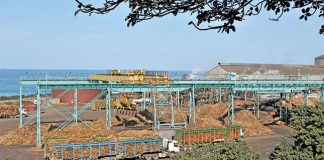
Four South African chemicals companies have received approval from the country’s Competition Tribunal (CompTrib) to continue with their arrangement to trade ammonia between each other.
The CompTrib recently rejected the Competition Commission’s (CompCom) finding that the ammonia storage sharing and trading agreement between AECI, Foskor, Omnia Fertilizers and Sasol SA could potentially and substantially prevent or lessen competition in SA’s ammonia market.
CompTrib spokesperson Chantelle Benjamin said that the CompCom’s concerns emerged from its July 2012 discovery that the four chemicals companies were equal partners in an ammonia storage facility (ASF) at Richard’s Bay harbour in KwaZulu-Natal.
Adding to these concerns was that these companies had agreed on a formula to determine the price at which they would sell ammonia to each other at the ASF should two of the companies be unable to agree on a price on a bilateral basis.
Ammonia is a common ingredient in agricultural fertiliser products.
Benjamin further explained that the CompCom had subsequently required the four chemicals companies to withdraw the formula for calculating the price that they would sell ammonia to each for from their ammonia storage and trading agreement for the ASF.
The CompCom then approved that these companies could only loan ammonia stocks from each other at the ASF and that these stocks had to be physically replaced by the loanee within an agreed-upon time frame.
On reviewing the CompCom’s requirements in this particular case, the CompTrib found that the four chemicals companies appeared not to have contravened any aspects of SA competition law and that the CompCom “neglected to establish a proper theory of harm” emanating from these companies’ agreement at ASF.
Based on its findings, the CompTrib refused to confirm the consent agreement between the CompCom and the four chemicals companies and where these companies had initially been required to amend their agreement for sharing ammonia storage and trading ammonia at the Richard’s Bay facility.
By the time of going to print, none of the four chemicals companies had responded to Farmer’s Weekly’s requests for their comments regarding the CompTrib’s decision.












